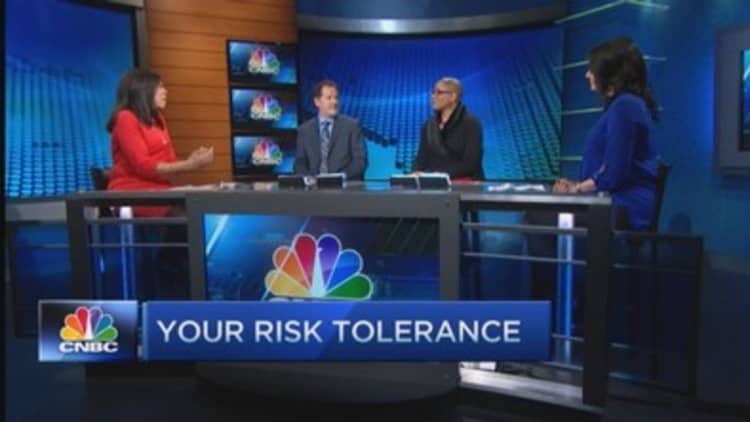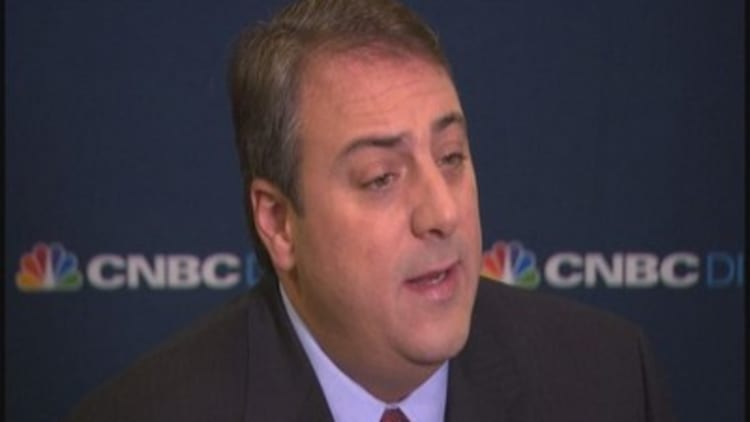
Determining your risk tolerance—generally defined as the ability to stomach large swings in the value of your investment portfolio—is an important component of investing. And it's a determination that should never be taken lightly.
If the goal is to make sure the money you need is there when you need it, accurately assessing your risk tolerance should be done before you figure out what investments belong in your portfolio.
CNBC.com recently talked with Craig Cowles, a certified financial planner and partner at Cardinal Wealth Advisers, about risk tolerance and the variables that affect it.
CNBC: What are the key considerations that go into determining an investor's risk tolerance?
Read MoreAdvisors point to best bets
Craig Cowles: The No. 1 consideration is looking at how long until the person will need the money. The breakpoint is a 10-year horizon. We're good with much higher risks for anything beyond 10 years than less than that. Another consideration is current liquidity: How much cash do you actually have on hand? If you start investing all your money thinking you won't need it for 10 years but you don't have enough current liquidity to cover your current expenses, that would be a problem.
Also look at factors like: What kind of job do you have? What are the risks there? Is it a permanent position or a contract job? How many dependents do you have? Do you have a child or other family member with special needs? That all goes into whether you need money now or 10 years or more down the road. Also, think about the value of money to you.
What's the most risk you've ever taken in your life, and what was the result of that, good or bad? It doesn't have to be about money.Craig Cowlespartner at Cardinal Wealth Advisers
CNBC: Are you talking about the value system of the person or the monetary value of the investment?
Cowles: The values of the person. What about money is important to that person? The risk you are going to take is going to match who you are. A lot of times clients say it's freedom or it's security. They might say they want to make sure their family is taken care of. And how do we translate that into a portfolio management model that might help match that?
Read MoreWhat keeps investors up at night
CNBC: How do you help people accurately determine if they can handle volatility in the stock market until they actually experience it?
Cowles: I ask an analogous question to the client: What's the most risk you've ever taken in your life, and what was the result of that, good or bad? It doesn't have to be about money. Say someone says they went bungee jumping and they were scared to do it but did it anyway and it was an exhilarating experience. That kind of thing can tell me a lot. I can tell what their comfort zone is and that they are willing to go outside their comfort zone. Ups and downs in the market might be okay with them.
CNBC: Once you know that, what comes next?
Cowles: I ask how long until you need this money, how much are you going to need, and how are you going to feel when you get there. Tell me how you'd feel if you actually achieved that goal. Once you figure out that goal, my job is to help the client first combat the silent thief, inflation, which averages about 3 percent a year. And there's a fee involved for [managing the portfolio], so overall we need to generate at least 3 percent to 4 percent every year, on average. So then the risk is on top of that. We might need to generate up to 8 percent or 9 percent, on average, to meet their goal. People can relate to that because you have an endgame dollar amount, and then the rate of return they will need to get there.
Read MoreHow your brain impoverishes you
CNBC: What events in a person's life can contribute to a changing risk tolerance?
Cowles: A lot of times it's based on current cash flow and expenses. It could be a job loss or be medical-related from an accident or from illness. It could be a family member who needs something. It could be that your parent had a stroke and is now an invalid and you are the only one able to take care of the parent. Also, your risk tolerance goes down the closer you get to needing the money.

CNBC: What happens if a married couple has different risk tolerance?
Cowles: Normally when couples come to me, I like to find out first how they were raised regarding money. They may have agreed on money but never really talked about it in depth.
CNBC: So how do you accommodate differing views to the extent that it would affect how they invest their money?
Read MoreGauging investor-risk readiness
Cowles: The best way is to first talk about what their goals are. It's kind of a mediated platform at that point to bring them together. You shift the conversation away from risk and say we're going to discuss your values, get some mutually agreed-upon goals and then set the risk level. Based on what I feel needs to happen to make those goals happen, let me put my two cents in about what kind of risk they should be at.
CNBC: How does an individual self-assess their risk tolerance?
Cowles: It goes back to how long until they are going to need the money. How experienced are they at making decisions about investments? Some people think being a hobbyist investor is the way to go and if they're good at it and have a knack for it and it proves successful, it might be the way to go for them. But what I find is that the larger amount of money you get, the more likely you are to stop trusting yourself to make the right decisions. That's when people are more likely to [find] an advisor.
—Sarah O'Brien, special to CNBC.com




